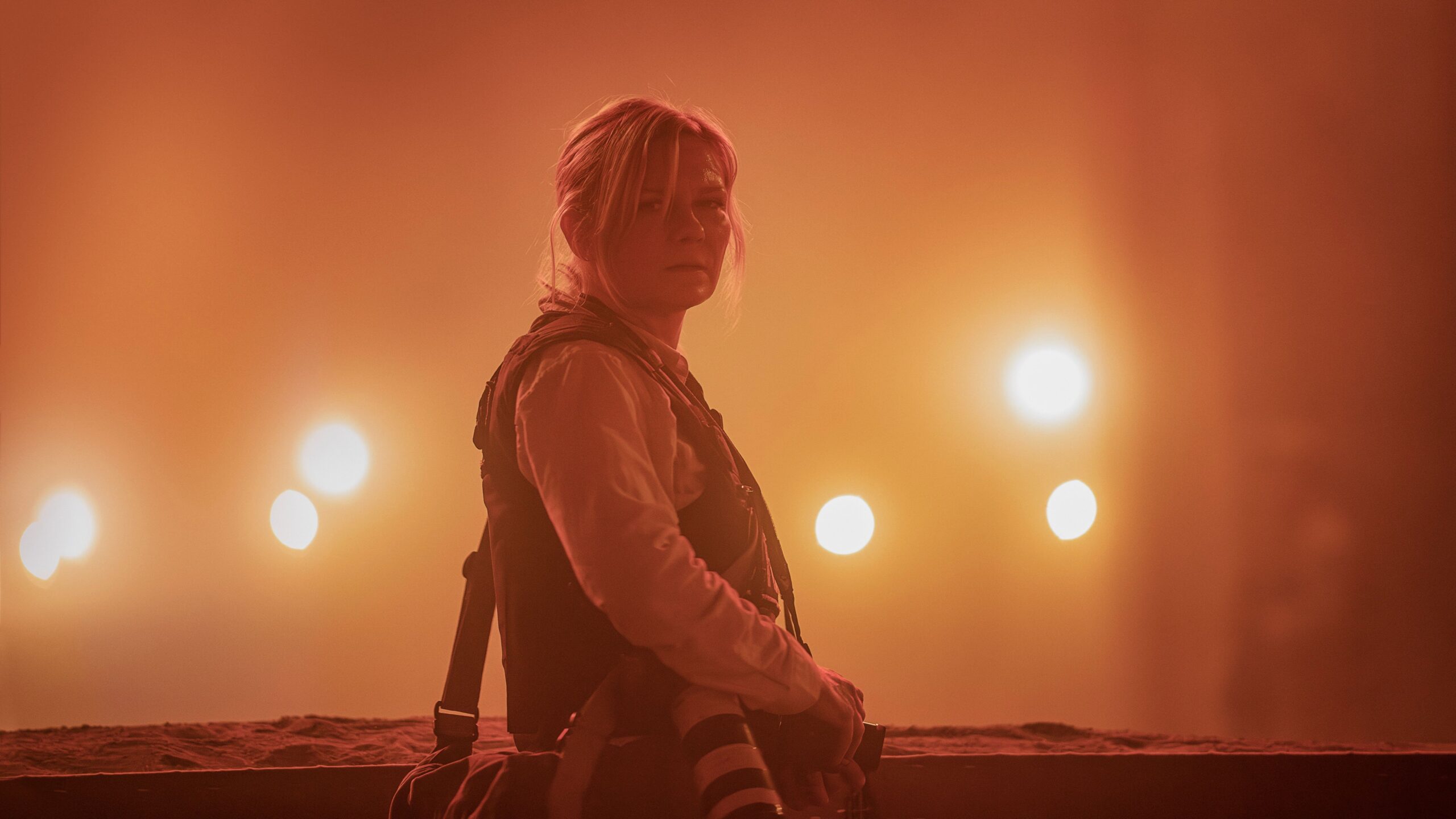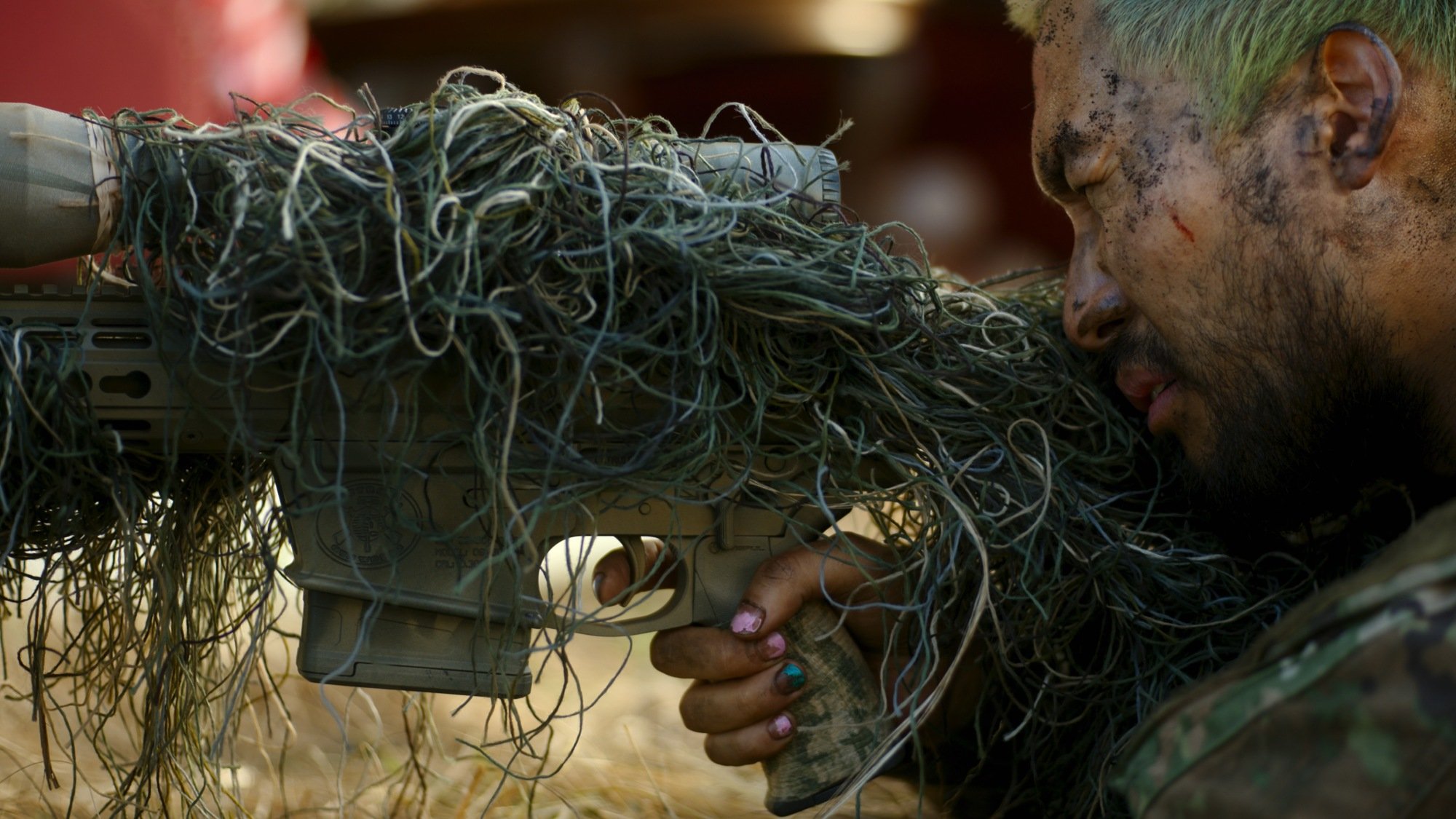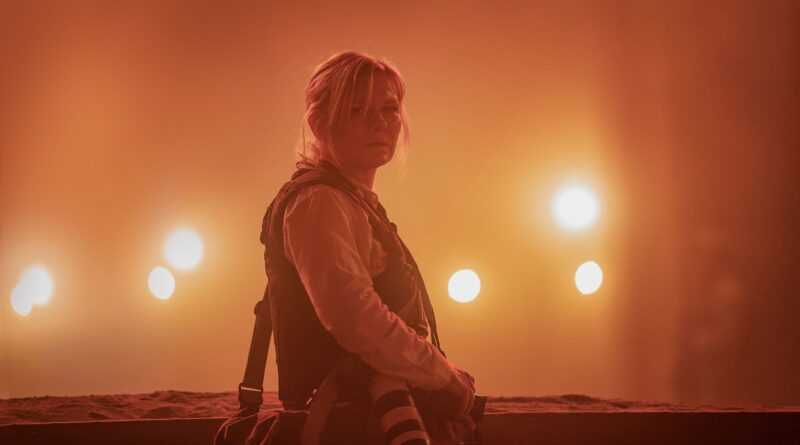‘Civil War’ review: Alex Garland’s latest is more ‘Men,’ less ‘Ex Machina’

Alex Garland has made his mark on cinema combining thrilling genre setups with social commentary, ranging from the epic Ex Machina to the bewildering Annihilation and the underwhelming Men. In his latest, the English writer/director wags his finger at America, warning us of the dangers of autocracy with Civil War.
If you watched the first trailer and wondered what had caused California and Texas to not only secede but also join forces against the U.S. government, Civil War will offer no answer. The details of why the war began are sprinkled in among dialogue about a president who refuses to speak to the press and has bombed American civilians. The why of the war is not the point, and as such Garland keeps politics out of it. (Perhaps that also helps avoid polarizing could-be movie-goers?)
In Civil War, there’s not talk of red or white, Republican or Democrat, conservative or liberal. And to a point, that is compelling, as it instead urges audiences to focus on how an us-versus-them mentality can be as nebulous as it is dangerous. However, as was true in Men, Garland’s epiphany feels shallow, as if delivered from an outsider looking in.
Civil War takes its cues from Children of Men.

The specifics of these films’ conceits vary, but the core of their story is the same: In a world where widespread disaster is imminent, a hardened cynic is given fresh cause for hope in a dangerous quest to preserve something sacred.
In Alfonso Cuarón’s thrice Oscar-nominated dystopian thriller, the hero is a former political activist (Clive Owen) who has to overcome his world-weariness to protect a miraculously pregnant woman in a world gone infertile. In Civil War, Kirsten Dunst stars as Lee, a war photojournalist who has grown cold as a coping mechanism from witnessing the worst of humanity. While her homeland is ripping itself to pieces, she and a journalist named Joel (Wagner Moura) are plotting a course from a scorched Manhattan to the White House. There, they hope to interview and photograph the embattled president (Nick Offerman) before the Capitol falls.
While this trip would typically be a commute of a few hours, devastation on major highways pushes them into small towns and not-so-cozy corners of America, where violence and ignorance are prized above any sense of unity. But Lee and Joel are not alone on this quest; they’re accompanied by Sammy (Lady Bird‘s Stephen McKinley Henderson), a veteran reporter who may be older and out of shape but still has fight in him, and Jessie (Priscilla‘s Cailee Spaeny), an aspiring photojournalist who idolizes Lee. Together, they set forth on a road trip pitted by gunfire, cruelty, and a jarring shopping detour.
Each stop functions as a vignette in which Garland exposes a corner of American wrath, wrong-headed self-righteousness, or apathy. And like with Children of Men, where the quest is born from ideology — in this case, Lee’s dedication to journalism — it becomes achingly personal. Seeing a bit of herself in Jessie, Lee takes risks to protect the young woman, even as she laments that their work demands putting themselves in harm’s way.
Civil War has echoes of a Western.
This structure is the stuff of the gunslinger who lives on the fringe of society, often because of his vocation’s proximity to violence. But when the civilized world needs a hero, the gunslinger is uniquely skilled to pull the shot that could change things for the better. Here, that shot could come from Lee’s camera. Though she is often amid soldiers and gunfire, on her hip is that camera, its lens focused unblinkingly onto America.
Dunst is sensational in the role, which could have felt stiff in the hands of a lesser actor. But boiling beneath Lee’s stoic facade is a war of regret, rage, and worry, released only in the occasional flash of her eyes at the naive and too gung-ho Jessie. Spaeny proves a solid scene partner, charged with an energy that wavers from enthusiastic to anxious and back again like a puppy or a hotshot duelist (Think Leonardo DiCaprio in The Quick and the Dead). For his part, Moura has the swagger of a shiny-badged deputy who feels untouchable because of his mission. Henderson provides balance as a grandfatherly figure, carrying worry and warmth in equal measure.
There are black hats here too, the most terrifying of them played by Dunst’s real-life partner, Jesse Plemons. Wearing fatigues, a snarl, and an incongruent pair of pink, heart-shaped sunglasses, he delivers a line that hits hard in the trailer: “What kind of American are you?” It’s a trap of a question, and everyone faced with it is all too aware. This place, a vague stretch between NYC and Washington, D.C., is the new Wild West, where the rules are made by whoever’s got the quickest draw.
All of this leads to a catastrophic climax in D.C. that is sprawling and spectacular, throwing unarmed journalists into the thick of the action. Here, like in Men, Garland has his audience caught up in the tension and life-or-death stakes. But even as the final shot is sharply executed, the film overall lacks focus.
Civil War is undermined by its dearth of specificity.
When it comes to structure, Garland has smartly leaned on the tried-and-true framework of a cynical protagonist transformed by a quest to preserve an innocent. But Garland’s depiction of America is achingly generic.
A sequence in a gas station manned by gun-toting rednecks, a perfectly unruffled small town with gleaming white exteriors, a ugly office park shot up by warring factions — these are all settings found along their road trip, but none feel specific to a place. All feel like an idea of America that doesn’t recognize the cultural differences not only state to state but even town to town. These spaces are physically diverse from each other but not distinctive in a way that might allow Americans to recognize them as real. Their inhabitants rarely have accents, which is a dizzying choice considering the journalists’ route takes them through Western Pennsylvania and presumably Maryland, both places with pronounced and distinctive accents. Their clothes range from casual to resort wear, prim florals to military gear, but their outfits rarely connote a sense of place. And so the film often feels ungrounded, lost in a gesture at America rather than a ruthlessly authentic portrait someone like Lee would capture.
One exception takes place in a firefight between a pair of men in fatigues and an unseen shooter from a far-off farm house. Lee and her crew crouch near the would-be soldiers, who are hiding in a sprawling Christmas display of lawn ornaments, all battered and sun-scorched in the summer heat. Though the gunman hidden in the house will never be seen, the decorations outside their home gives a strong sense of who they are and were. This winter wonderland once welcomed visitors, but the decay of this festive spectacle reflects the gunman’s shift from friendly to territorial. The once-proud display has been warped into a grisly carnival game where the goal is to pick off the intruders. And the feeling is mutual. While Joel begs the shooters for information on who’s fighting who, they roll their eyes between fired rounds. That’s beside the point when someone’s aiming a gun at you. Your options are fight, flight, or roll up and die.
That’s an engaging insight for one sequence. But as the film lurches from one vignette to another with unwieldy pacing, there’s little sense of progress in the journey because of all the details Garland willfully ignores. Not just the politics, but the cultural flourishes that set states apart, the accents that speak swiftly to background, the slang that sings of commonality or culture clash.
Perhaps all this ambiguity was intentional. Maybe Garland was trying to show Americans have much more in common than they realize, for better or for worse. But the effect of flattening America into cliched depictions of big cities, small towns, and rural offshoots suggests he doesn’t understand this nation well enough to be making such grand statements about its future.
With Ex Machina, Garland lured audiences into an intriguing and isolated realm of robotic splendor and human hubris. Keeping the film brutally focused on its core space and its handful of characters, he built the perfect setting to explore toxic masculinity and the flaws in a white knight narrative. With Men, the pull of its harried heroine was darkly enchanting, presenting the overwhelming terror inherent in rape culture through a town entirely peopled by the same man in different roles, all of them bent toward some form of domineering menace. But from there, he added nothing new or all that thought-provoking about the experience of women in a man’s world.
And now, with Civil War, Garland goes much, much bigger, aiming a critical lens at not just an idea like misogyny or grief but an entire nation and its history. Along the way, he shovels in a slew of characters, and ends up losing the trees for the forest. Pulled back so wide, this thought-provoking filmmaker’s argument is lost amid his muddy portrayal of a nation that is no stranger to internal conflict, buried beneath the nuances and details he papers over with a smug indignation.
Civil War was reviewed out of SXSW 2024; A24 will release the film in theaters April 12.
